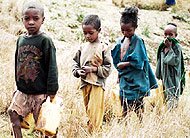 The Primary School Years
The Primary School Yearsvia: Unicef
The primary school age population is estimated to be almost 14 million in 2002/2003 which is about one fifth of the total population. About 36.6 per cent of the school age population is not enrolled in primary schools.
Primary school years in Ethiopia are characterised by:
• Low enrollment and attendance; high repetition and drop outs
o Though primary schooling in Ethiopia is free for the average Ethiopian living below one dollar a day it is difficult to cover their families’ school expenses like uniforms, exercise books and school maintenance cost
o Families may be reluctant to send their children to school, since they depend on their children’s labour for survival. Family do not understand the value of sending their children to school.
o About 72 per cent of school-age children have no access to formal education.
o The net primary enrollment ratio at the national level was 54 per cent in 2002/2003 with an average growth rate of 11.3 per cent over the last 5 years. The net enrollment ratio is 47.2 per cent for girls and 60.6 per cent for girls. Net primary attendance is even lower.
• Disparities
o More than 60 per cent of primary school children did not have the chance to continue to grade 5. Girls’ repetition and drop out rates are higher than boys.
o Girls’ participation is lower than boys for all regions except the capital city Addis Ababa. Nationally the female and male enrollment in 2002/2003 is 0.7.
• Resources and facilities
o Nationally, only 3 per cent of Ethiopia’s schools have clinics serving students. About 75 per cent of the population suffer from some form of communicable disease.
o Primary school children have to walk long distances and through difficult terrain to attend school often in crowded classroom, inadequate trained teachers, school materials. Without proper sanitation, in four out of 10 children will not reach their full educational potential.
o Play grounds are basically nonexistent in Ethiopia, though play have a significant role in the primary years of life and helps children develop socially, emotionally and intellectually.
o A demographic and Health Survey conducted in 2000 found that 55 per cent of Ethiopian children under the age of five are stunted due to malnutrition.


No comments:
Post a Comment